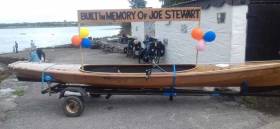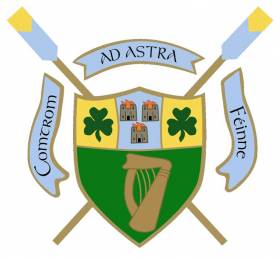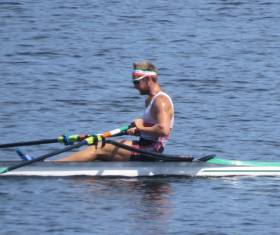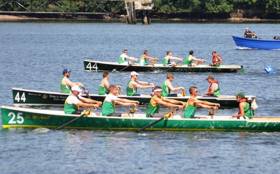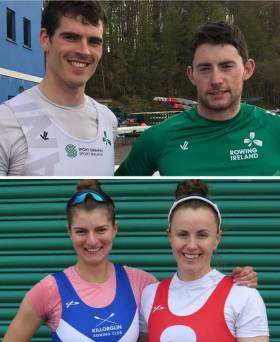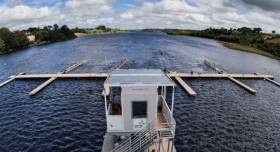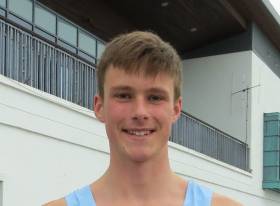Displaying items by tag: rowing
Kinvara Artist Rowing Shannon-Erne Waterway in Handmade Boat for Hospice
A south Galway potter is embarking on a 350km row down the Shannon-Erne waterway in a handmade boat in memory of a close friend writes Lorna Siggins
Weather permitting, Kinvara artist Joe McCaul (65) set out from Belleek, Co Fermanagh today on the first leg of his transit to Limerick.
With him will be a heart-shaped box with ashes of his close friend, Joe Stewart, a carpenter and experienced oarsman from Antrim who had planned to build the plywood rowing boat with him.
Mr McCaul will raise funds for the Galway Hospice as a tribute to Mr Stewart.
“The boat is named after the two Joes, and he would get a good laugh out of it if he was here,” Mr McCaul said.
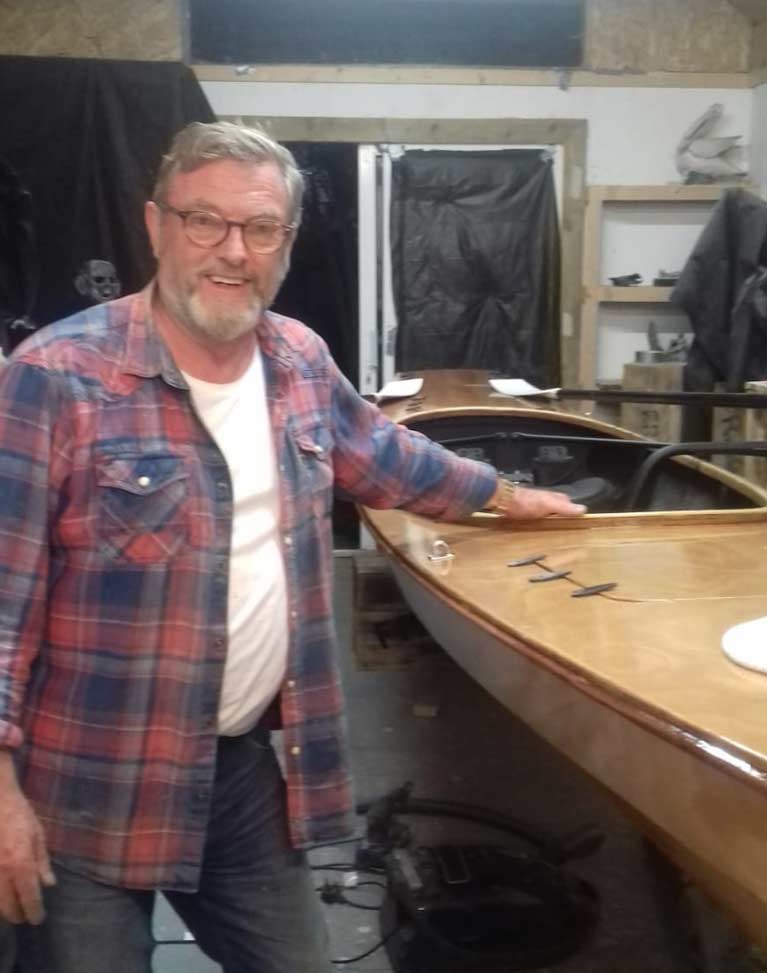 Joe McCaul with his rowing boat in build
Joe McCaul with his rowing boat in build
“It started off with a chat in a pub, and I said I would love to build a boat,” Mr McCaul says.
“Joe Stewart died in his sleep, and I rang the suppliers the day we buried him and they said the boat kit was ready for dispatch, so I decided to go ahead and finished it myself,”Mr McCaul explains.
Growing up near the waterway at Belturbet, Co Cavan, he says he is looking forward to navigating the Shannon-Erne system, and reckons lower Lough Erne will be the most exposed part.
He tested the craft for its rolling ability by capsizing it a week ago in Galway Bay, and reckons it is easy to right.
It was launched at the Cruinniú na mBád in his home harbour of Kinvara, south Galway earlier last month, and he says that “the QE2 could not have had a better send-off when it first hit the water”.
Mr McCaul will draw and paint en route through towns including Belleek, Enniskillen, Belturbet, Ballinamore, Leitrim, Carrick-on-Shannon, Roosky, Athlone, Shannonbridge, Terryglass, Scarriff, Killaloe and finally to Limerick.
His wife, Mary Harrison, retires from teaching shortly and is undertaking a walk along the Camino route in northern Spain. He plans to fly out to Bilbao in Spain when he is finished and they can compare notes on their respective pilgrimages on land and water.
For updates and to support Joe McCaul’s rowing fundraiser for Galway Hospice, see here
The refixed University Rowing Championships of Ireland at Lough Rinn saw UCD and Trinity take some of the big prizes. NUIG and UCD tied on points in the overall rankings, with UCD crowned champions because they had seven wins to NUIG’s six.
UCD also won the Wylie Cup for men, coming out on top by virtue of taking the senior and novice eights.
Trinity’s women won the Bank of Ireland trophy because of their victories in the intermediate and club eights. NUIG won the women’s senior eights.
#Rowing: Gary O’Donovan took sixth place in his heat of the lightweight single sculls at the European Rowing Championships in Lucerne this morning. The Skibbereen man, competing for the first time at this level in a single, found himself at the back of the field early on and while he pushed into fifth he saw the race disappear from him in the final sprint. Martino Goretti of Italy set the early pace and won.
European Championships, Lucerne, Day One (Irish interest)
Men
Double – Heat One (First Two to A/B Semi-Finals; rest to Repechages): 1 Ireland (P Doyle, R Byrne) 6:26.53, 2 Romania 6:29.62.
Lightweight Single Sculls – Heat One (First Two to A/B Semi-Finals; rest to Repechages): 1 Italy (M Goretti) 7:05.54, 2 Switzerland (J Schaeuble) 7:06.73; 6 Ireland (G O’Donovan) 7:34.73.
Over the years, rowing has had its highs and lows in Cork Harbour, where the history of the sport on Leeside as the River Lee wends its way from the city towards the harbour mouth, can be traced to the founding of the Cork Harbour Rowing Club in Glenbrook.
That is one of three closely-linked harbourside communities, situated between the town of Passage West and the village of Monkstown, both of which have followed the rowing tradition, even though the Glenbrook Club no longer exists.
Even though it is no longer in existence, the 160th anniversary of its founding will be celebrated this Saturday with the marking of the ‘Passage of Time” at Passage West, when the town’s Rowing Club hosts ‘The Middle Harbour Race.’
“Today, the sport is stronger than ever in our harbour with three river clubs, six coastal clubs and a very active currach scene. Saturday will see boats of all descriptions take to the water to celebrate the history of rowing in the harbour,” Laura O’Mahony of the Passage Club told me. 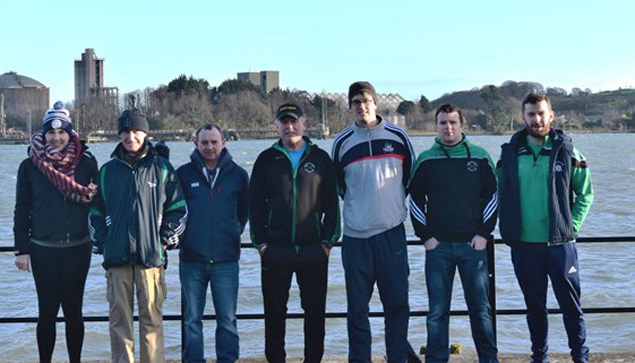 Passage West Rowing Club Committee
Passage West Rowing Club Committee
Racing will begin at 11 a.m. and include the Fr. Mathew Challenge for currachs, the Captain Mackey Challenge for kayaks; the Ringmahon House Challenge, for FISA/one designs; the Lough Mahon Challenge 3km sprint and a very special 3-mile race for the Middle Harbour Cup.
"The town of Passage West will be en fete on Saturday when rowing will be the dominant harbour sport"
The year after its foundation, the Cork Harbour Rowing Club held its inaugural regatta when its crew rowed a three-mile race in 18 minutes. That record remains unbroken to this day. The crew which set that, so far unbeaten record was: A. Stamers, E. Minehear, P. Power, T. Boland and Charles J. Leahy, the coxswain).
The Middle Harbour Challenge Cup race will recall the setting of that record and it will be interesting to see if it can be beaten.
The town of Passage West will be en fete on Saturday when rowing will be the dominant harbour sport.
Along with the races, there will be shoreside entertainment. This will include a special exhibition in Passage West Maritime Museum adjacent to the quayside about the history of Cork Harbour rowing; a market of locally-produced crafts and goods, a ‘Picnic in the Park’ and the Cobh Animation Team demonstrating clothing worn back in 1859 when the Cork Harbour club was founded.
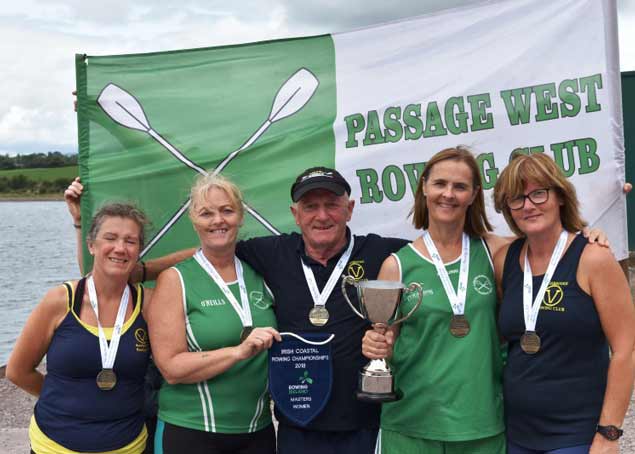 Passage West Rowing Club women's coastal rowing winners
Passage West Rowing Club women's coastal rowing winners
More on the podcast, listen below
Irish Schools and University Championships Cancelled
#Rowing: Powerful winds and very choppy water forced the cancellation of the Irish Schools and University Championships at Lough Rinn today.
The early part of the programme went ahead, but after two hours of action, the conditions had deteriorated with no prospect of improvement. Boats were taking on water and some rowers had fallen in.
A decision on the Lough Rinn regatta tomorrow (Sunday) will be made later today. It is likely to go ahead, but may have some alterations to the schedule.
Aifric Keogh & Monika Dukarska and Philip Doyle & Ronan Byrne Share Rower of the Month Prize
The award for the Afloat Rowers of the Month for March is shared between the women’s pair of Aifric Keogh and Monika Dukarska and the men’s double of Philip Doyle and Ronan Byrne.
Both crews excelled at the Ireland Trial and the National Rowing Centre on the final weekend of March. Keogh and Dukarska, who are a new combination for this season, had a consistently good level of performance through the three-day test.
Doyle, a medical doctor, could only make the final two days. Constraints through injury and time pressure have meant that this crew have not had much time together since they finished ninth at the World Championships in 2018. Yet, they combined wonderfully and raced well.
Rower of the Month awards: The judging panel is made up of Liam Gorman, rowing correspondent of The Irish Times and David O'Brien, Editor of Afloat magazine. Monthly awards for achievements during the year will appear on afloat.ie. Keep a monthly eye on progress and watch our 2019 champions list grow.
Doyle and Byrne Form Winning Combination at Ireland Rowing Trial
#Rowing: The double of Philip Doyle and Ronan Byrne performed brilliantly for Ireland last year, culminating with a ninth-place finish at he World Championships. They took up where they left off at the the Ireland Trial at the National Rowing Centre today. The heavyweight crew beat the lightweight double of Paul O’Donovan and Fintan McCarthy in a fine race in the first session. McCarthy and O’Donovan had never raced together before, but still finished well and were just over four seconds behind Doyle and Byrne in dead calm conditions.
Some of the contests in this first of two sessions were handicapped to produce good racing and it worked. Sanita Puspure did not win her race but had a very good time, while the pair of Aifric Keogh and Monika Dukarska won in another impressive time.
The new junior coxed four of John Kearney, Jack Dorney, James O’Donovan and Matthew Gallagher, with cox Leah O’Regan were just pipped in their race – but again excelled in terms of time for this boat.
One of the more interesting crews to be trialled was the senior four of Eimear Lambe, Aileen Crowley, Emily Hegarty and Claire Feerick. Another four was to be trialled in the second session. This opens up a possibility of a single, a pair and a four going forward on the women’s heavyweight side.
The combination of Rory O’Neill of Castleconnell and Finn O’Reilly of Skibbereen were the top men’s junior double.
Puspure Honoured for World-Beating Year
#Rowing: The Afloat Rower of the Year 2018 is Sanita Puspure. The Old Collegians competitor proved herself the best single sculler in the world. She took silver at the World Cup regattas in Belgrade and Lucerne, running the defending champion, Jeannine Gmelin of Switzerland, extremely close (.23 of a second) in the Lucerne final.
Working with coach Dave McKenzie McGowan and high performance director Antonio Maurogiovanni, who set a very heavy training schedule, Puspure decided to miss the European Championships so that she could concentrate on the World Championships in Plovdiv in Bulgaria in September. She won her heat and semi-final, and then overcame bobbly conditions in the final. She established a clearwater lead. Gmelin came back at her in the third quarter; Puspure was not for catching. She won by two lengths of clear water.
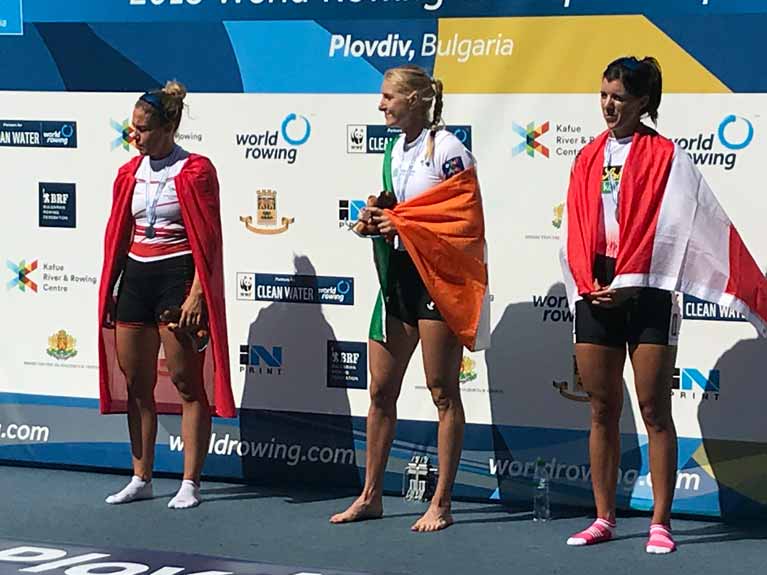 Sanita Puspure (centre) smiles after being presented with her gold medal at the World Championships. Jeannine Gmelin (silver) is on the left and Magdalena Lobnig (bronze) on the right. Photo: Liam Gorman
Sanita Puspure (centre) smiles after being presented with her gold medal at the World Championships. Jeannine Gmelin (silver) is on the left and Magdalena Lobnig (bronze) on the right. Photo: Liam Gorman
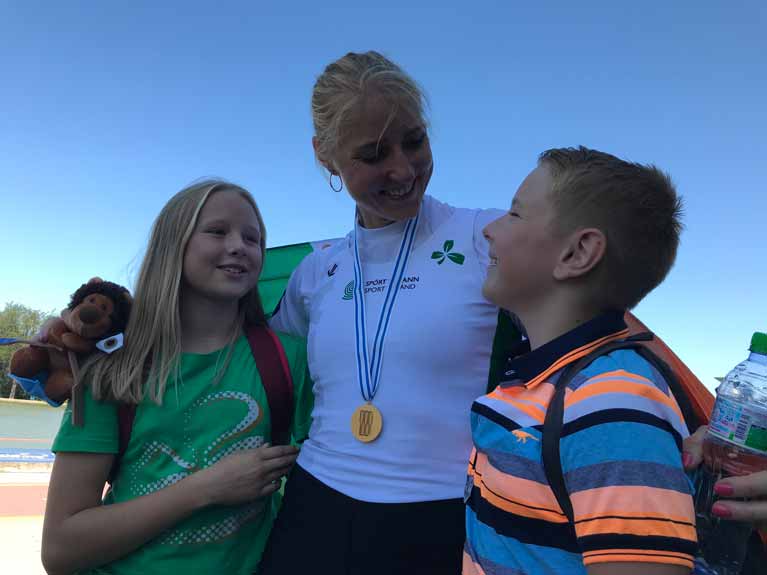 Sanita with Daniella and Patrick, her children, after winning World Championship gold. Photo: Liam Gorman
Sanita with Daniella and Patrick, her children, after winning World Championship gold. Photo: Liam Gorman
The win was a twin highlight at the end of a wonderful year. The O’Donovan brothers, Gary and Paul, won the lightweight double sculls gold in Plovdiv, making history as the first Ireland crew to take World Championship gold in an Olympic boat. They overcame terrible conditions and a poor lane draw to win in the quarter-final. This was succeeded by a semi-final in which they looked tired and could only take third. The final saw them in the unfavoured lane six for the final.
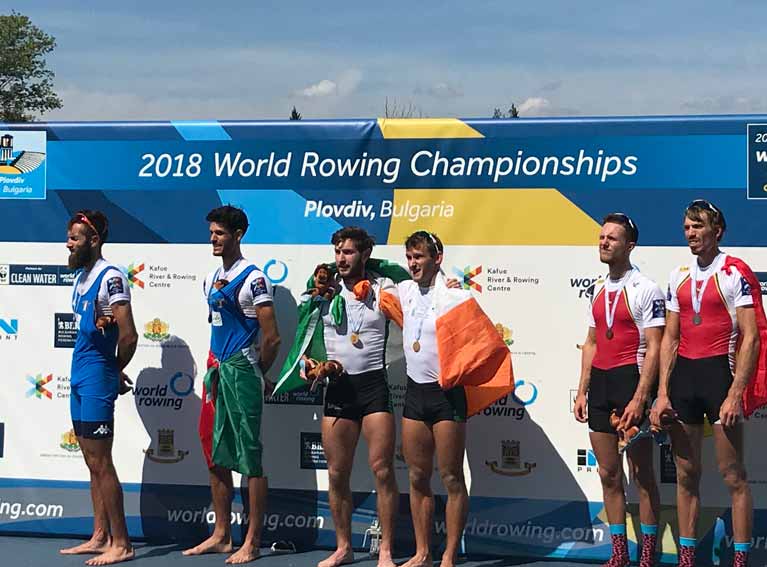 Ireland gold medalists Gary and Paul O'Donovan on the World Championship podium in Plovdiv, Bulgaria, with Italy (silver) and Belgium (bronze)
Ireland gold medalists Gary and Paul O'Donovan on the World Championship podium in Plovdiv, Bulgaria, with Italy (silver) and Belgium (bronze)
In a stirring race, the Skibbereen men saw off Italy. They would describe it as the best race they had ever rowed. They were outstanding in their steadiness, and over the second, third and fourth quarters they were the fastest crew. They took over the lead from Italy between 1200 and 1500 metres and rebuffed the charge by the men in blue to win by three-quarters of a length.
In a first for a women’s sweep crew from this island in an Olympic boat, Aifric Keogh and Emily Hegarty, the Ireland women’s pair, also reached an A Final at the World Championships. The World Under-23 Championships were also laden with success, with four A Finalists, gold for Shane Mulvaney and David O’Malley in the lightweight pair and silver for Miles Taylor, Niall Beggan, Ryan Ballantine and Andrew Goff in the lightweight quadruple.
Come the Fisa World Rowing Awards, Dominic Casey was honoured as the coach of the year.
In a season of success, Sanita Puspure is the Afloat Rower of the Year.
Afloat Rower of the Month awards: The judging panel is made up of Liam Gorman, rowing correspondent of The Irish Times, and David O'Brien, editor of Afloat magazine. Monthly awards for achievements during the year appeared on afloat.ie.
Rowing Ireland Trial Cancelled at Farran Wood Due to Bad Weather Forecast
#Rowing: The Ireland Trial set for tomorrow, Saturday, at the National Rowing Centre at Farran Wood in Cork has been cancelled because of bad weather. No plan for Re-scheduling has been announced.
Shandon Sculler Dorney Wins In Boston
#Rowing: Ireland’s Jack Dorney came in fastest of 36 starters in the Men’s Youth Singles at the Head of the Charles Regatta in Boston.
Mark O’Donovan and Shane O’Driscoll placed eighth in the Directors Challenge Men’s Quadruple, while O’Driscoll and O’Donovan were seventh in the Championship Double. Shannon took second in the Men’s Masters Eight.
The Trinity men’s eight finished 11th in the Club Eight despite starting at the back of the field.
Gary O’Donovan, who entered the men’s Championship Single, did not travel.


























